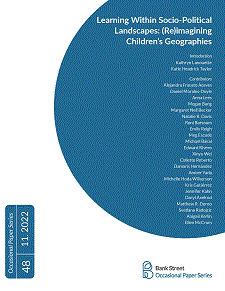Number 48
(2022)
Learning Within Socio-Political Landscapes: (Re)imagining Children’s Geographies
Click here to read the StoryMap version (ArcGis).
Full Issue
Learning Within Socio-Political Landscapes: (Re)imagining Children’s Geographies
Kathryn Lanouette and Katie Headrick Taylor
Articles
Learning Within Socio-Political Landscapes: (Re)imagining Children’s Geographies
Kathryn Lanouette and Katie Headrick Taylor
More than Civil Engineering and Civic Reasoning: World-Building in Middle School STEM
Alejandra Frausto Aceves and Daniel Morales-Doyle
We’re Not Migrating Yet: Engaging Children’s Geographies and Learning with Lands and Waters
Anna Lees and Megan Bang
How Urban Forest School Gave Us the Connections We Needed During the Pandemic
Margaret Nell Becker
Children as Design Visionaries, Learners, and Socio-Political Wayfinders: Mapping the Layers, Hierarchies, and Rhythms of a School Community
Natalie R. Davis and Roni Barsoum
Mapping Racespace: Data Stories as a Tool for Environmental and Spatial Justice
Emily Reigh, Meg Escudé, Michael Bakal, Edward Rivero, Xinyu Wei, Collette Roberto, Damaris Hernández, Amber Yada, Kris Gutiérrez, and Michelle Hoda Wilkerson
Stories From Islita Libre: Digital Spatial Storytelling as an Expression of Transnational and Immigrant Identities
Jennifer Kahn, Daryl Axelrod, Matthew Deroo, and Svetlana Radojcic
Learning to See More Clearly: Extending Lucy Sprague Mitchell’s Vision for Geography Teaching
Abigail Kerlin and Ellen McCrum


Kathryn Lanouette, GSE '06, is assistant professor of learning sciences and science education at William & Mary’s School of Education. In collaboration with schools and museums, her research and teaching explore how place-based pedagogies and emerging technologies can be central to young people’s learning about science and data science in ways that build towards more joyful and ethical futures. Her scholarship is shaped by her teaching experiences in Washington, DC and New York City. Lanouette has published in Science Education, Educational Researcher,The Journal of the Learning Sciences, and Mathematical Thinking and Learning.
Guest Editor Katie Headrick Taylor

Katie Headrick Taylor is associate professor of learning sciences and human development at the University of Washington’s College of Education. Research-practice partnerships led by Taylor center racial and gender equity in STEM, data science, and digital literacy. These collaborations have occurred across museums, public libraries, public schools, homes, undergraduate courses, and family-serving organizations in New York, Chicago, Nashville, Seattle, and nonmetropolitan areas of East Tennessee. Her scholarship and teaching focus on community well-being through the digital re-mediation of learning, foregrounding the ingenuity that young people from immigrant and/ or communities of color have within and across contexts. Taylor’s commitment to care as a design value for digitally-mediated learning interventions has been fundamentally shaped by her roles as mother, daughter, educator, and writer. Funded by, among others, the National Science Foundation, the NAEd/ Spencer Foundation, and the Heising-Simons Foundation, Taylor’s research and public scholarship can be found in venues such as The Conversation, The Journal of the Learning Sciences, Cognition & Instruction, Connected Science Learning, and Learning, Media, & Technology.